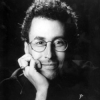Tony Kushner

Tony Kushner
Anthony Robert "Tony" Kushneris an American playwright and screenwriter. He received the Pulitzer Prize for Drama in 1993 for his play Angels in America: A Gay Fantasia on National Themes. He co-authored with Eric Roth the screenplay for the 2005 film Munich, and he wrote the screenplay for the 2012 film Lincoln, both critically acclaimed movies, for which received Academy Award nominations for Best Adapted Screenplay. For his work, he received a National Medal of Arts from President Barack Obama...
NationalityAmerican
ProfessionScreenwriter
Date of Birth16 July 1956
CityNew York City, NY
CountryUnited States of America
I don't feel, finally, that my politics are entirely determined by the fact that I'm a gay man.
God knows I've had productions where there were actors in my plays who were making more money per week than I was.
Gay TV has been immensely important in transforming American culture in a more gay-positive direction.
There's a way in which 'The Illusion' is a play about the theater.
You don't go to the movies to do historical research, unless it's historical research about the movies.
A handful of works in history have had a direct impact on social policy: one or two works of Dickens, some of Zola, 'Uncle Tom's Cabin' and, in modern drama, Larry Kramer's 'The Normal Heart.'
I think I'll always be a better playwright than a pundit, but I believe that writers should be public intellectuals and that theater, even more than film, is a place of public debate.
I had a dream, in 1985, I believe, when a friend I'd gone to school with was sick - one of the first people I knew who'd gotten the AIDS virus. I had a dream of him in his bedroom with an angel crashing through the ceiling. I wrote a poem called 'Angels in America.' I've never looked at the poem since the day I wrote it.
I grew up in a small Southern town, and there were white people and black people. Coming to New York to go to Columbia, every time I went into the subway I was absolutely astounded because you see people from all over the world who actually live here - who aren't just here as tourists.
I go into any movie that's historical fiction thinking, 'OK, I'm here to watch a work of art, something delivering a series of opinions, and if it's a good work of art, these opinions become so deeply embedded in complexity and richness that I won't even be bothered by the opinions. I'll make my own mind up.'
I don't write political plays in the sense that I'm writing essays that are kind of disguised as plays. I would really defy anyone to watch any of my plays and say 'Well, here's the point.'
But I think what made me go into theater was seeing my mother onstage. The first thing she did was Mrs. Frank in 'The Diary of Anne Frank.' The second thing she did was a play about Freud called 'The Far Country.' She played a paralyzed woman in Vienna who goes to see Freud.
But I still read Shaw on a regular basis. What I love is the nakedness of the polemic and the irresistible good humour. For me, 'Major Barbara' is the greatest of all the plays in that it starts from the rational and proceeds to the ecstatic in a spectacular way, and leaves you very confused if you cling to Euclidean logic.
Accuracy is paramount in every detail of a work of history. Here's my rule: Ask yourself, 'Did this thing happen?' If the answer is yes, then it's historical. Then ask, 'Did this thing happen precisely this way?' If the answer is yes, then it's history; if the answer is no, not precisely this way, then it's historical drama.